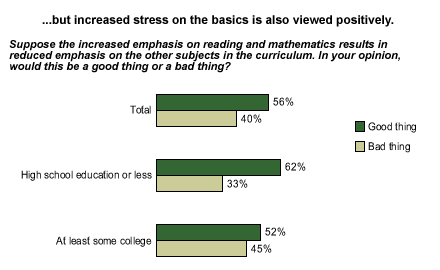No Child Left Behind (NCLB), the sweeping education law that President Bush signed in January 2002, mandates that all U.S. states immediately establish standards for learning in reading and math and begin testing students on their progress toward those standards in the 2002-2003 school year. Similar standards must be established for science by the 2005-2006 school year. But what about social studies, foreign languages, music and the many other subjects that appear on students' class schedules? Should America's schools be devoting significant time and often-scarce resources on these additional subjects, or should curricula focus largely on the three Rs -- reading, 'riting and 'rithmetic?
Americans have mixed feelings on this issue, according to the 34th Annual Phi Delta Kappa/Gallup Poll of the Public's Attitudes Toward the Public Schools*. While a majority of U.S. adults want public high school students to be offered a wide variety of courses, a majority also favors an increased emphasis on reading and mathematics, even at the cost of other subjects in the curriculum.
Basic Courses or a Wide Variety of Courses?
Gallup asked 1,000 U.S. adults if they would prefer that their local high schools offer a "wide variety of courses," or "fewer basic courses, such as English, mathematics, history and science." A clear majority (57%) said high schools should offer a wide variety of courses, compared to 41% who would prefer fewer courses. The percentage who prefer a wide variety of courses has risen significantly since this question was first asked 23 years ago, when more Americans seemed to favor a more traditional approach to education. In 1979, 44% said high schools should offer a wide variety of courses, while 49% preferred fewer, more basic courses. This may in part be a reflection of the fact that far more high school students plan to continue on to college today -- 63% in 2001, compared to 46% in 1983 -- and parents want their children to have access to a wider variety of high school courses that will help them prepare for the rigors of a college curriculum.


Emphasis on Reading and Mathematics
Although Americans like the idea of a broad variety of course offerings, they also like the idea of emphasizing reading and math over other subjects. Survey respondents were asked whether they think it would be a good thing or a bad thing if increased emphasis on reading and mathematics resulted in reduced emphasis on other subjects in the curriculum. Fifty-six percent -- nearly the same percentage who said they favor a wide variety of courses over fewer courses -- said that increased emphasis on reading and math over other courses would be a good thing.
Opinion on this question varies according to the respondent's level of education. Sixty-two percent of those with a high school education or less feel that increased emphasis on reading and math at the expense of other subjects would be a good thing, compared to 52% of those with at least some college education who felt the same way. Again, the difference could reflect the broader variety of courses in the college environment -- adults who attended college may feel that students will benefit from a curriculum that more closely resembles that offered at colleges and universities.
Key Points
Americans want their children to have a variety of subject choices at school, but they also believe that reading and math are the most important subjects and should be emphasized as such. Data from an August 2002 Gallup Poll** reinforce this view, indicating that English and math are the subjects that Americans use most as adults. When asked which subject has been most valuable to them in their lives, more than half of U.S. adults say either math (34%) or English/literature/reading (24%). History (7%) was a distant third, and all other subjects came in at 4% or less.
Given the new standards imposed by NCLB and the public's views on the composition of school curricula, it appears that U.S. schools would be well advised to offer a generous selection of courses while still putting the most stress on reading and math. Reading and math skills are a vital part not only of our professional lives, but our everyday lives as well -- whether we're reading the newspaper, paying for groceries or balancing our checkbooks. Students need a well-rounded education, but they need the basics first and foremost.
*These results are based on telephone interviews with a randomly selected national sample of 1,000 adults, aged 18 and older, conducted June 5-26, 2002. For results based on this sample, one can say with 95% confidence that the maximum error attributable to sampling and other random effects is ±3%. In addition to sampling error, question wording and practical difficulties in conducting surveys can introduce error or bias into the findings of public opinion polls.
**Results are based on telephone interviews with 1,007 national adults, aged 18 and older, conducted Aug. 5-8, 2002. For results based on the total sample of national adults, one can say with 95% confidence that the maximum margin of sampling error is ±3%.